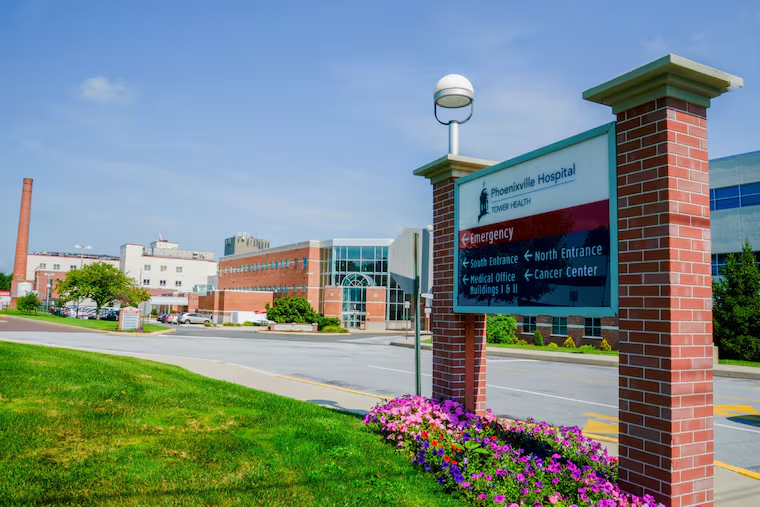Tower Health’s cash reserves are extremely low, sinking by $331 million over the last 12 months
Tower lost $200 million and reported 54 days of cash reserves, extremely low for a system of its size.

Tower Health’s long-standing financial troubles continued in April, May and June of this year.
The nonprofit health system, which is based in West Reading, Berks County, reported Monday that it had enough cash to keep running for just 54 days without any new revenue.
That number, which excludes cash that Tower has to pay back to Medicare shortly, is extraordinarily low for a system with more than $2 billion in annual revenue and more than $1.3 billion in long-term debt.
“We’re aware of that,” Tower’s president and chief executive officer, P. Sue Perrotty, said in an interview when Tower released its results for the year.
Perrotty said she and other Tower executives remain focused on boosting the financial operations of Tower’s hospitals and other businesses by finding ways to increase revenue and save money by operating more efficiently. “We’re doing a lot of things to see if we can get operations turned” around, she said.
Asked whether Tower has enough time to improve operations and stop burning through cash, Perrotty said: “That’s what we’re going to find out. We’re still working on that. Time is our enemy. There’s no question.”
Tower, which is anchored by Reading Hospital, started the pandemic in a deep hole because its previous chief executive, Clint Matthews, spearheaded a dramatic expansion from 2017 to 2019 into Southeastern Pennsylvania with acquisition of five community hospitals, a chain of urgent-care centers, and St. Christopher’s Hospital for Children in a joint venture with Drexel University.
Losses at Tower started before the pandemic as newly acquired hospitals didn’t perform as well as expected. Tower closed Jennersville Hospital in December and Brandywine Hospital in January, and earlier this month, the health system announced a deal to sell Chestnut Hill Hospital. Tower intends to continue running Phoenixville, Pottstown, and Reading Hospitals, as well as St. Chris in partnership with Drexel.
Although Tower’s lack of cash is significant, they are not alone in facing financial challenges. Even financially strong health systems are either losing money or logging relatively thin profit margins this year, in part because of a sharp spike in labor costs.
» READ MORE: Tower Health records massive loss on St. Chris and other hospitals it bought in Philadelphia region
“The headwinds are very significant,” Perrotty said. Insurance companies “are negotiating as hard as they can not to have to cover any of the increased costs. Employees are negotiating hard to make sure they get a little bit of increase in their pay to cover the inflation costs they all are feeling. You’ve got a lot of pressures pushing against health care.”
Tower’s revenue in the year ended June 30 was $2.17 billion, down slightly from $2.19 billion the previous year. Its operating loss was $195 million, down from $244 million the year before.
But financial experts say the focus has to be on Tower’s unrestricted cash reserves, which totaled $369 million on June 30, a decline of $331 million over the 12-month fiscal year. Tower still owes $28 million to Medicare under a program that advanced hospitals cash to help them through the early months of the pandemic. Excluding that money from reserves, Tower has just 54 days of cash on hand.
Days of cash on hand is a rolling measure that changes as cash comes in and is then used to pay bills. At Tower, the key financial measure was extraordinarily high at nearly a year in 2017 before the expansion.
Fitch Ratings, one of the three major credit rating organizations, said a dozen health systems it rates with annual revenues between $1.75 billion and $2.5 billion had a median of 260 days of cash.
Thomas Jefferson University is the only other Philadelphia-area health system to have reported financial results for fiscal year 2022 as of this week. Excluding Health Partners Plans Inc., a Medicaid insurer Jefferson bought last November, it had 198 days of cash on June 30, down from 265 last June.
Jefferson, which also acquired Einstein Healthcare Network last year, had an operating loss of $125 million on $8 billion in revenue. The loss would have been greater without $119 million in government COVID-19 relief.